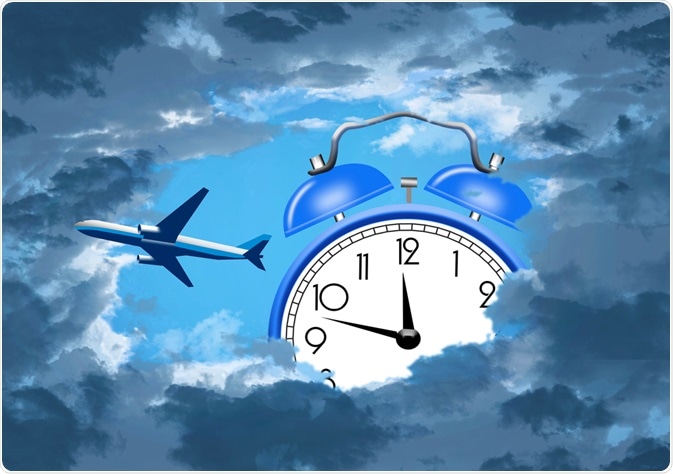Jet lag occurs when there is disharmony between the biological clock and the external time zone. The body has a daily rhythm of activity which responds to sunlight, achieved by the secretion of neurotransmitters such as melatonin.
 Image Credit: robertindiana/Shutterstock.com
Image Credit: robertindiana/Shutterstock.com
This basically sets our sleep-wake cycle. This inner clock, also called the circadian clock (which means “an approximately one-day clock”), is located in the part of the brain called the suprachiasmatic nucleus (SCN), within the hypothalamus.
Light signals from the retina reach the SCN, and these are normally greater during the daytime. These signals, in turn, turn the circadian clock forward or backward, fine-tuning it in accordance with the light-dark cycles of the physical world outside.
Most physiological functions are tuned to this 24-hour clock, including temperature fluctuations, hormonal levels, digestion, heart rate and blood pressure, and the brain’s activity cycles. They wax and wane with the passage of time on this clock, forming a distinctive pattern of physiological activity.
The circadian rhythm is in harmony with the solar day in most sighted people. However, blind people, who do not use light as a zeitgeber, which is any naturally occurring phenomenon that acts to regulate the body’s circadian rhythm, have no natural circadian rhythm. Their bodies operate on free time. In order to fall in with the normal rhythms of sighted people, they need to undergo effective synchronizing treatments.
How does melatonin work? It acts through type 2 receptors to cause phase shift. In other words, it shifts the circadian clock forward or backward to match the outside time. It also stimulates dopamine release within the retina, produces vasodilation and slows down the rolling movements of white cells in the bloodstream.
At the same time, it boosts immune responses. The SCN actually contains a grid of little neuronal clocks. Their rhythmic firing depends on the discharge of periodic synchronization nerve impulses to most of the nerve cells in it. On the other hand, if only a few neurons are connected or are firing, the clock fails to achieve synchronization.
How does the SCN respond to sunlight? It is theorized that light and other stimuli act as synchronizers, coordinating the external light-dark cycle with the circadian clock. These are called zeitgebers, or time-givers, because they ‘give the time’ to the body, or tell the body what time it is on earth.
Non-light zeitgebers could be temperature, exercise, the timing of meals, interactions with other people, or even drugs like melatonin analogs. It has thus been observed that when the body temperature is lowest, sleep comes fastest, and the melatonin secretion is the highest. When the circadian clock is desynchronized, insomnia sets in.
However, when a traveler passes into a different time zone at a speed that is faster than the passage of outside time, this harmony is disrupted. This is why jet lag worsens with the number of time zones crossed. Thus circadian desynchronization is key to the sleep disruption, psychological and physiological perturbations that are recognized to be part of jet lag.
Jet lag wears off as the zeitgebers of the new time zone slowly re-entrain the inner clock to synchronize with the time zone of the traveler’s destination. The most important zeitgeber is the light-dark cycle, and exposure to sunlight, therefore, shortens the duration of jet lag. Again, the phase shift takes less time if the traveler sets up a timetable for scheduled exposure to bright light in the days leading up to the flight and immediately afterward.
Travelers in the eastward direction require their circadian clocks to be set forward, to realign with their destination time which is ahead of their biological time. This is called a phase advance. On the contrary, a phase delay is required to reset the circadian clock when flying westward.
Phase advance takes longer than phase delay. Thus the phase delays on westward flights at about 92 minutes a day, while the phase advances at 57 minutes a day when flying east. This is because the human circadian clock already takes a little more than 24 hours to recycle itself. The natural drift towards a later time makes it easier to set the clock backward than to advance the phase.
References
Further Reading
Last Updated: May 19, 2021